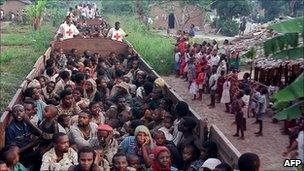UN report says DR Congo killings 'may be genocide'
- Published

A UN report into the killings of Hutu civilians in the Democratic Republic of Congo during the 1990s says they may constitute "crimes of genocide".
It accuses Rwandan, Ugandan and Burundian forces of participating in the attacks, and recommends that the international community seeks to prosecute those responsible.
The document's publication prompted angry denials from all the countries.
But the Congolese government said the report was credible and heartbreaking.
"The victims deserve justice and they deserve that their voices are heard by my government and by the international community," its UN representative, Ileka Atoki, said in a statement.
DR Congo was "appalled at the horrific nature and scope" of the crimes documented in the report, he added.
However, the government said the information in the document was not new and that a previous request by DR Congo President Joseph Kabila to establish an international criminal tribunal had been ignored by the UN.
It also made no specific comment on the allegations of genocide.
'More nuanced language'
The Mapping Report documenting the most serious violations international humanitarian law committed within DR Congo between 1993 and 2003 details crimes never previously documented.
It covers 617 incidents and includes allegations of massacres of civilians, torture, and the destruction of infrastructure that led to civilian deaths.
The report says several incidents in 1996 and 1997 pointed to "circumstances and facts from which a court could infer the intention to destroy the Hutu ethnic group in the DRC in part".
"The extensive use of edged weapons... and the apparently systematic nature of the massacres of survivors after the camps had been taken suggests that the numerous deaths cannot be attributed to the hazards of war or seen as equating to collateral damage."
Rwanda's government has always said its troops entered DR Congo to pursue the militiamen responsible for the 1994 genocide of Tutsis.
But the report says a very high number of Hutu civilians were shot, raped, burnt or beaten, and the attacks took place after refugees had allegedly been screened by the Rwandan army (APR) and the Congolese rebel movement it supported, the Alliance of Democratic Forces for the Liberation of Congo (AFDL).
"The apparent systematic and widespread attacks described in this report reveal a number of inculpatory elements that, if proven before a competent court, could be characterized as crimes of genocide," it concludes.
In one incident cited in the report, AFDL/APR units allegedly killed around 500 refugees at the bridge over the Ulindi river at Shabunda in February 1997.
After the massacre, it says, villagers were made to dump the bodies in the river and clean the bridge. The soldiers allegedly then forcefully led away the survivors and executed them the following day.
The report calls for a full judicial investigation to take place to determine whether these "incidents amount to the crime of genocide".
The BBC's Mark Doyle says the draft report spoke of "damning" reports of "systematic and widespread attacks" which, if proven in court, "could be classified as crimes of genocide".
The final version is more nuanced, speaking of "apparent" attacks, which "could be characterised as crimes of genocide", our correspondents says.
The UN said the language was not changed because of pressure from the countries accused of atrocities, and that UN lawyers always reviewed important reports, he adds.
'Rewriting history'
Despite the changes, Rwanda categorically rejected the report.
"The desire to validate the double genocide theory is consistently present throughout the draft Mapping Report by mirror-imaging the actors, ideology, and methods employed during the 1994 Rwandan genocide," a government statement said.
Correspondents says the charge of genocide is particularly sensitive for the government of Rwanda's President Paul Kagame who portrays himself as the man who ended the genocide of his Tutsi people.
Rwandan Foreign Affairs Minister Louise Mushikiwabo said the document remained "flawed and dangerous from start to finish".
She criticised the methodology used to collect evidence and accused the UN of seeking to rewrite history.
President Kagame threatened to withdraw Rwandan troops from UN peacekeeping operation in response to the draft report. He was only persuaded not to after Rwanda would be allowed to submit comments for inclusion.
Uganda, which had also threatened to pull out of peacekeeping missions, said the report was not well-considered or objective.
Burundi also rejected the conclusions, saying they were "clearly aimed at destabilising the region".
The east of DR Congo is still plagued by army and militia violence despite the end of the country's five-year war in 2003 in which more than five million people lost their lives - the deadliest conflict since World War II.